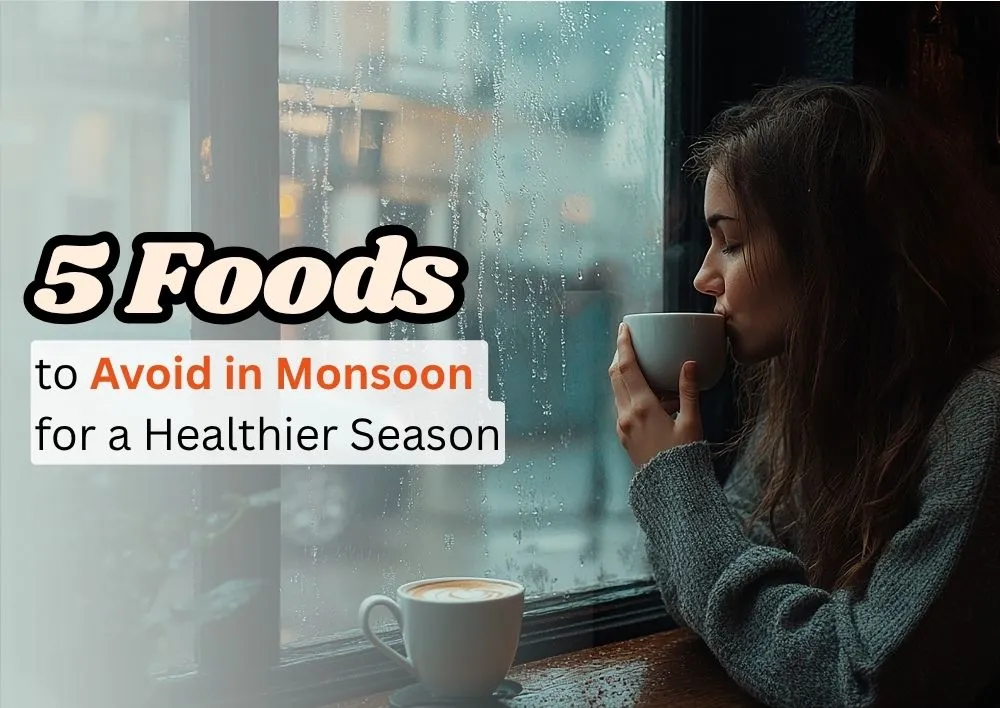5 Foods to Avoid in Monsoon for a Healthier Season
Summary: Monsoon increases the risk of stomach infections and foodborne illnesses. Avoid leafy vegetables, fried and oily street food, seafood and raw meats, curd and paneer, and pre-cut fruits or raw salads from outside. These foods can harbor bacteria and upset your digestion during the rainy season. Choose freshly cooked meals, safe seasonal vegetables, and whole fruits to protect your health.
Overview:
Monsoon is coming, and it makes us crave hot snacks, street food, and fried food. But before you give in to those tempting pakoras and spicy chaats, take a moment to think about your health. The rainy season may look beautiful outside, but inside your body, it is a bit of a tricky time.
Monsoon conditions like high humidity, waterlogging, and unhygienic food practices increase the risk of bacterial and viral infections. As a result, your stomach becomes more sensitive, and your immunity drops. That is why it becomes important to watch what you eat during this time.
In this blog, we will explore 5 common foods to avoid in the monsoon to stay safe from infections, indigestion, and stomach problems.
1. Leafy Vegetables
Yes, we all know that green leafy vegetables like spinach, fenugreek, and cabbage are healthy. But during the rainy season, they can be risky.
Because of excessive moisture in the air and unhygienic storage conditions, leafy greens become a perfect home for germs, dirt, and insects. Even after washing, some bacteria may remain.
Dr. Ajay Kaushik, the best general physician in Gurgaon at Miracles Mediclinic, says, "We usually see an increase in stomach infections and food poisoning cases during the monsoon. One of the common causes is the consumption of contaminated leafy green vegetables."
Vegetables to Eat in Monsoon
Go for vegetables like bottle gourd, ridge gourd, bitter gourd, and tinda during this time. They are more hygienic, gentle on the stomach, and packed with nutrients.
2. Fried and Oily Street Food
A rainy evening, hot pakoras, and a cup of tea sound like a perfect combo, right? Unfortunately, this tempting treat is also one of the common foods to avoid in the monsoon. Fried street food is usually prepared in reused oil and handled in unhygienic conditions. On top of that, our digestion slows down during the rainy season, making oily food harder to process.
Dr. Ajay shares, “Every monsoon, we get possibilities of food poisoning, especially due to roadside snacks. People forget that taste can come at the cost of their health.”
Food to Eat During Monsoon
To satisfy your craving, prepare your favorite snacks at home using fresh ingredients and clean oil. This way, you enjoy the rain without risking foodborne infections.
3. Seafood and Raw Meats
Seafood lovers, beware. During monsoon, fish and prawns are in their breeding phase, which raises concerns about freshness and safety. This means they are more prone to spoilage, and their quality becomes doubtful. Even raw meat can spoil fast due to humidity and improper storage.
Dr.Kaushik warns, “Seafood is best avoided during monsoon. It carries a higher risk of stomach infections and food poisoning if not fresh or properly cooked.”
Foods To Eat During a Rainy Day
Eat eggs only if they are fully cooked, and chicken only if it is fresh and clean. Or even better, eat vegetarian food for a few weeks to give your stomach a break.
4. Curd and Paneer
Curd and paneer may be part of your daily diet, but in monsoon, they can do more harm than good. These dairy products tend to become sour quickly and can upset your stomach. If you are already prone to cough, cold, or sinus issues, curd can make things worse.
Dr. Ajay explains, “The body experiences a cooling effect from curd. In monsoons, this effect can upset digestion and lead to throat problems. Opting for a lighter alternative is a healthier choice during monsoon."
What to eat instead
Go for light options like cumin-spiced buttermilk or gentle turmeric milk. These are easier on your gut and can even help boost immunity.
5. Pre-Cut Fruits and Raw Salads from Outside
Fruits are healthy, no doubt. But pre-cut fruits or raw salads bought from vendors or stalls can be loaded with germs. They are often washed with tap water, kept uncovered, and exposed to flies and dust.
Dr. Kaushik explains, “We always tell patients to avoid pre-cut fruits during monsoon. The chances of infection are high, especially if you don’t know how and where they were cut and stored.”
Which fruits to eat in the monsoon?
Buy whole fruits and wash them well at home. Seasonal fruits like bananas, apples, and pears are safer options. Avoid water-heavy fruits like watermelon as they spoil fast in humid weather.
Extra Tips to Stay Healthy During Monsoon
-
Drink boiled or filtered water only
-
Avoid eating leftovers kept outside the fridge
-
Wash vegetables and fruits thoroughly
-
Eat freshly cooked, warm meals
-
Add turmeric, ginger, garlic, and lemon to your diet
-
Practice good hand hygiene and avoid touching your face frequently
Conclusion:
Monsoon may feel refreshing, but it can challenge your health. Protect yourself by making smart food choices and embracing seasonal, gut-friendly meals. Knowing the right foods to avoid during monsoon can help protect your stomach and boost your immunity.
By avoiding these five common foods and following expert suggestions, you can enjoy the rainy season without worrying about your health. If you feel uneasy after eating or notice any signs of stomach infection, don’t ignore it. Book a consultation with an experienced general physician near you at Miracles Healthcare, Gurgaon, and get the right treatment on time. Your health matters even more during monsoon!







.webp)







Was the information useful?
0 0